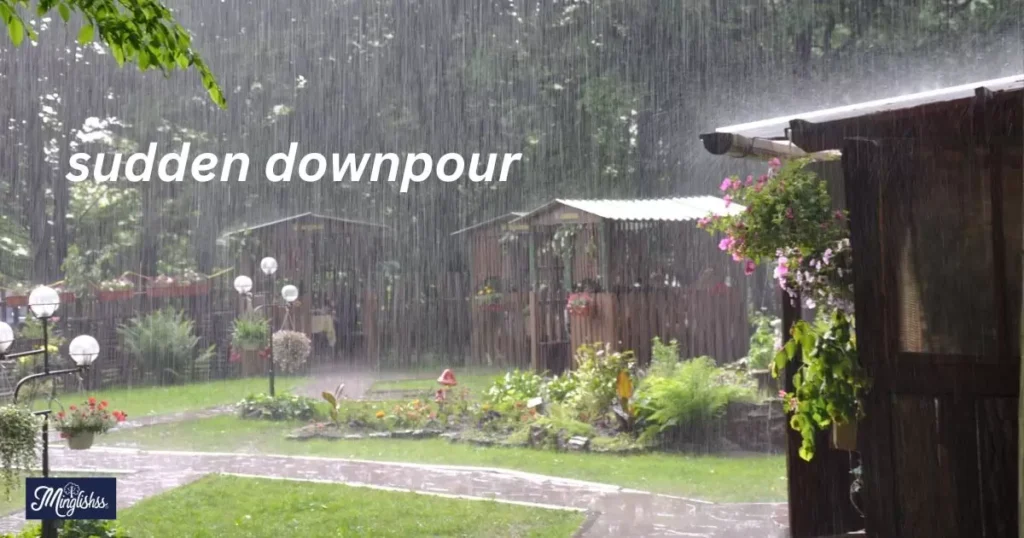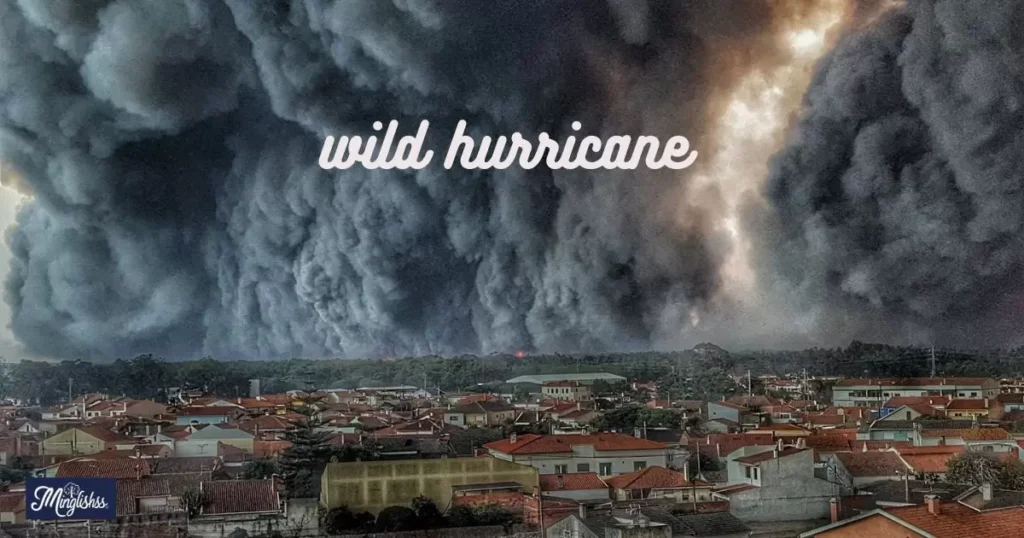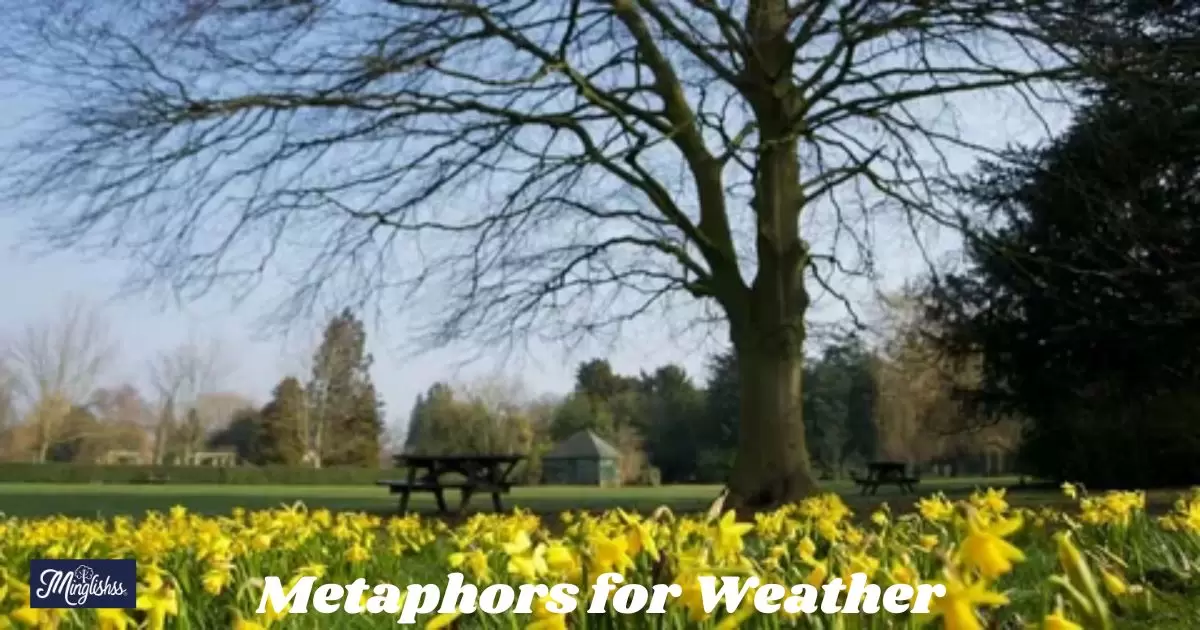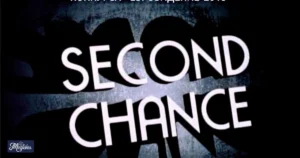Weather can evoke a wide range of emotions and imagery, from the serenity of a clear sky to the turbulence of a storm. Using metaphors to describe atmospheric conditions can add depth and vividness to your writing, making it more engaging and relatable.
This blog post explores various metaphors for weather, offering meanings, example sentences, and explanations for each one.
1. Like a calming breeze
Meaning: Gentle and soothing.
Example Sentence: “The news of the agreement was like a calming breeze, easing tensions and bringing a sense of peace.”
Explanation: This metaphor compares weather to a gentle breeze, highlighting its soothing and relaxing effect on the situation.
2. Like a raging storm
Meaning: Intense and chaotic.
Example Sentence: “The debate became like a raging storm, with voices clashing and arguments swirling.”
Explanation: Comparing a situation to a raging storm emphasizes its intensity and chaotic nature, reflecting the turbulence of the weather metaphor.
3. Like a blinding sun
Meaning: Extremely bright or overwhelming.
Example Sentence: “Her smile was like a blinding sun, lighting up the room with its brilliance.”
Explanation: This metaphor highlights the overwhelming and radiant quality of brightness, likening it to the intense glare of the sun.
4. Like a gentle rain
Meaning: Mild and nurturing.
Example Sentence: “Her words were like a gentle rain, providing comfort and encouragement in a difficult time.”
Explanation: Comparing a comforting action to gentle rain emphasizes its soothing and nurturing effect, akin to the calming presence of light rain.
5. Like a freezing winter night
Meaning: Harsh and biting.
Example Sentence: “The reception was like a freezing winter night, cold and unwelcoming.”
Explanation: This metaphor conveys a sense of harshness and discomfort, comparing the unwelcoming atmosphere to the coldness of a winter night.
6. Like a sweltering summer day
Meaning: Hot and oppressive.
Example Sentence: “The meeting was like a sweltering summer day, dragging on with an oppressive heat.”
Explanation: Comparing a tedious or uncomfortable experience to a sweltering summer day emphasizes its intense and oppressive nature.
7. Like a sudden downpour

Meaning: Unexpected and intense.
Example Sentence: “The announcement hit the team like a sudden downpour, catching everyone off guard with its impact.”
Explanation: This metaphor captures the sudden and overwhelming nature of an event, likening it to the surprise and intensity of an unexpected rainstorm.
8. Like a thick fog
Meaning: Confusing and obscuring.
Example Sentence: “The details of the plan were like a thick fog, making it hard to understand the full picture.”
Explanation: Comparing confusion or lack of clarity to a thick fog emphasizes the difficulty in seeing or understanding, similar to the way fog obscures visibility.
9. Like a summer breeze
Meaning: Light and pleasant.
Example Sentence: “The conversation flowed like a summer breeze, easy and enjoyable.”
Explanation: This metaphor conveys a sense of ease and pleasantness, likening the smooth and enjoyable nature of a conversation to a gentle summer breeze.
Metaphors for Home: Creating Warm and Inviting Imagery
10. Like an approaching hurricane
Meaning: Imminent and powerful.
Example Sentence: “The changes in policy were like an approaching hurricane, looming with significant consequences.”
Explanation: Comparing a looming event to an approaching hurricane emphasizes its impending and powerful impact, reflecting the weather metaphor’s intensity.
11. Like a light snowfall
Meaning: Soft and delicate.
Example Sentence: “The gentle praise was like a light snowfall, adding a soft touch to the feedback.”
Explanation: This metaphor highlights the delicate and soothing nature of an action, comparing it to the gentle and subtle beauty of light snowfall.
12. Like a stifling heatwave
Meaning: Uncomfortably hot and oppressive.
Example Sentence: “The tension in the room was like a stifling heatwave, making everyone feel on edge and uncomfortable.”
Explanation: Comparing an uncomfortable situation to a stifling heatwave emphasizes its oppressive and intense nature, similar to the suffocating heat of extreme temperatures.
13. Like a clear blue sky
Meaning: Peaceful and unobstructed.
Example Sentence: “Her intentions were like a clear blue sky, transparent and free from any hidden motives.”
Explanation: This metaphor conveys clarity and peace, likening the transparency of intentions to the unobstructed view of a clear blue sky.
14. Like a summer thunderstorm
Meaning: Dramatic and short-lived.
Example Sentence: “The argument erupted like a summer thunderstorm, intense but over quickly.”
Explanation: Comparing a brief but intense conflict to a summer thunderstorm emphasizes its dramatic and temporary nature.
15. Like a chilly autumn wind
Meaning: Refreshing yet slightly uncomfortable.
Example Sentence: “The new policy felt like a chilly autumn wind, refreshing in its novelty but a bit unsettling.”
Explanation: This metaphor captures a mix of refreshing and uncomfortable feelings, likening it to the brisk and slightly uncomfortable chill of an autumn wind.
16. Like a blizzard
Meaning: Overwhelming and relentless.
Example Sentence: “The workload felt like a blizzard, relentless and covering everything in a blanket of tasks.”
Explanation: Comparing a heavy workload to a blizzard emphasizes its overwhelming and all-encompassing nature, similar to the relentless snowfall of a blizzard.
17. Like a tropical storm
Meaning: Intense and unpredictable.
Example Sentence: “The project’s challenges came like a tropical storm, intense and unpredictable, requiring quick adjustments.”
Explanation: This metaphor highlights the intense and unpredictable nature of challenges, likening them to the powerful and often sudden impacts of a tropical storm.
18. Like a serene dawn
Meaning: Calm and tranquil.
Example Sentence: “The resolution to the conflict was like a serene dawn, bringing calm and a fresh start to the situation.”
Explanation: Comparing a peaceful resolution to a serene dawn emphasizes the calm and refreshing nature of the outcome, similar to the tranquility of the early morning.
19. Like a gust of wind
Meaning: Sudden and forceful.
Example Sentence: “The announcement swept through the office like a gust of wind, quickly changing the mood and atmosphere.”
Explanation: This metaphor captures the sudden and forceful nature of an event, likening it to the quick and impactful change brought by a gust of wind.
20. Like a dense cloud
Meaning: Heavy and enveloping.
Example Sentence: “The mood in the room was like a dense cloud, heavy and enveloping everyone in a sense of gloom.”
Explanation: Comparing a gloomy atmosphere to a dense cloud emphasizes the heavy and pervasive nature of the feeling, similar to how a thick cloud covers the sky.
21. Like a sunbeam breaking through
Meaning: Hopeful and illuminating.
Example Sentence: “Her encouragement was like a sunbeam breaking through the clouds, offering hope and clarity in a difficult time.”
Explanation: This metaphor conveys a sense of hope and illumination, likening it to the uplifting and clarifying effect of sunlight breaking through clouds.
22. Like a sparkling frost
Meaning: Beautiful and crisp.
Example Sentence: “The new design was like a sparkling frost, adding a touch of beauty and freshness to the project.”
Explanation: Comparing beauty or freshness to sparkling frost emphasizes its crisp and visually appealing quality, akin to the delicate beauty of frost.
23. Like a roaring wind
Meaning: Powerful and overwhelming.
Example Sentence: “The protests grew like a roaring wind, becoming powerful and overwhelming as they gained momentum.”
Explanation: This metaphor highlights the power and intensity of a situation, comparing it to the forceful and overwhelming nature of a roaring wind.
24. Like a light drizzle
Meaning: Gentle and continuous.
Example Sentence: “The feedback was like a light drizzle, consistent and gentle in its delivery.”
Explanation: Comparing feedback to a light drizzle emphasizes its gentle and continuous nature, similar to the persistent yet mild effect of light rain.
25. Like a summer solstice
Meaning: Bright and peak.
Example Sentence: “The event was like a summer solstice, marking the peak of success and brilliance.”
Explanation: This metaphor emphasizes the peak and brightest moment, likening it to the summer solstice, which represents the longest day and highest point of the sun.
26. Like a foggy morning
Meaning: Unclear and mysterious.
Example Sentence: “The details of the plan were like a foggy morning, leaving everyone unclear and uncertain about the next steps.”
Explanation: Comparing unclear or uncertain information to a foggy morning emphasizes the lack of clarity and mystery, similar to the obscured visibility of fog.
27. Like a crisp autumn day
Meaning: Refreshing and invigorating.
Example Sentence: “The new approach felt like a crisp autumn day, refreshing and invigorating in its novelty.”
Explanation: This metaphor captures the refreshing and invigorating nature of a new idea or approach, likening it to the invigorating feel of a crisp autumn day.
28. Like a wild hurricane

Meaning: Chaotic and powerful.
Example Sentence: “The changes in the market were like a wild hurricane, chaotic and powerful, reshaping everything in its path.”
Explanation: Comparing market changes to a wild hurricane emphasizes their chaotic and powerful nature, reflecting the intense and disruptive impact.
29. Like a delicate snowfall
Meaning: Gentle and light.
Example Sentence: “The compliments were like a delicate snowfall, soft and gentle, making everyone feel cherished.”
Explanation: This metaphor highlights the gentle and light nature of compliments, comparing them to the soft and delicate effect of a light snowfall.
30. Like a warm summer night
Meaning: Comfortable and pleasant.
Example Sentence: “The gathering was like a warm summer night, comfortable and pleasant, with a relaxed and enjoyable atmosphere.”
Explanation: Comparing a pleasant gathering to a warm summer night emphasizes the comfortable and enjoyable nature of the experience.
31. Like a tempestuous sea
Meaning: Turbulent and unpredictable.
Example Sentence: “The negotiations felt like a tempestuous sea, turbulent and unpredictable, requiring careful navigation.”
Explanation: This metaphor conveys the turbulent and unpredictable nature of negotiations, likening them to the stormy and unpredictable sea.
32. Like a golden sunset
Meaning: Beautiful and serene.
Example Sentence: “The conclusion of the project was like a golden sunset, beautiful and serene, marking the end of a successful journey.”
Explanation: Comparing a successful conclusion to a golden sunset emphasizes its beauty and serenity, similar to the calming and picturesque end of a day.
33. Like a crisp morning frost
Meaning: Fresh and invigorating.
Example Sentence: “The new perspective was like a crisp morning frost, fresh and invigorating in its clarity.”
Explanation: This metaphor highlights the fresh and invigorating nature of a new perspective, comparing it to the crisp and refreshing effect of a morning frost.
34. Like a summer downpour
Meaning: Sudden and intense.
Example Sentence: “The sudden announcement hit like a summer downpour, intense and catching everyone by surprise.”
Explanation: Comparing a sudden announcement to a summer downpour emphasizes its intense and surprising nature, similar to the unexpected intensity of a heavy summer rain.
35. Like a refreshing rain shower
Meaning: Revitalizing and pleasant.
Example Sentence: “The positive feedback was like a refreshing rain shower, revitalizing and pleasant, renewing enthusiasm for the project.”
Explanation: This metaphor captures the revitalizing and pleasant effect of positive feedback, likening it to the refreshing and rejuvenating impact of a rain shower.
Answers to Key Questions
1. How can metaphors for weather enhance my writing?
Metaphors for weather enhance writing by providing vivid and relatable imagery, allowing readers to visualize and emotionally connect with the atmospheric conditions described, making the text more engaging and memorable.
2. Why use weather metaphors in descriptions?
Weather metaphors are effective because they evoke familiar and sensory experiences, helping readers understand and feel the conditions being described in a more nuanced and evocative way.
3. Can weather metaphors be used in different types of writing?
Yes, weather metaphors can be used in various types of writing, including fiction, poetry, journalism, and personal essays, to convey mood, atmosphere, and emotional states effectively.
4. How do I create my own weather metaphors?
To create your own weather metaphors, think about how different weather conditions can symbolize emotions, situations, or qualities. Consider how the characteristics of weather—such as intensity, clarity, or chill—can be applied to your subject matter.
5. What are some common themes in weather metaphors?
Common themes in weather metaphors include clarity, intensity, mood, and change. These themes help convey different aspects of experiences and emotions, drawing parallels between weather and personal or situational characteristics.
6. Where can I find inspiration for weather metaphors?
Inspiration for weather metaphors can be found in literature, poetry, and nature observations. Analyzing how different writers use weather metaphors can provide ideas and spark creativity for your own descriptions.
Conclusion
Metaphors for weather offer a rich tapestry of imagery and emotion, turning atmospheric conditions into powerful and evocative descriptions.
From the serene calm of a summer breeze to the chaotic impact of a tempestuous sea, these creative comparisons help capture the essence of various experiences and moods.
By employing weather metaphors, you can bring your writing to life, making abstract concepts more tangible and engaging for your readers.

Hi, I’m Ethan Matthews: I make English easy with my clear and simple teaching style. I love helping learners feel confident in every lesson.










